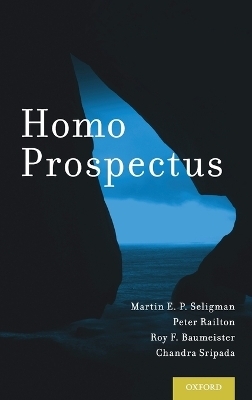
Homo Prospectus
Oxford University Press Inc (Verlag)
978-0-19-937447-2 (ISBN)
Much of the history of psychology has been dominated by a framework in which people's behavior is driven by past history (memory) and present circumstances (perception and motivation). Homo Prospectus reassesses this idea, pushing focus to the future front and center and opening discussion of a new field of Psychology and Neuroscience.
The authors delve into four modes in which prospection operates: the implicit mind, deliberate thought, mind-wandering, and collective (social) imagination. They then explore prospection's role in some of life's most enduring questions: Why do people think about the future? Do we have free will? What is the nature of intuition, and how might it function in ethics? How does emotion function in human psychology? Is there a common causal process in different psychopathologies? Does our creativity change with age?
In this remarkable convergence of research in philosophy, statistics, decision theory, psychology, and neuroscience, Homo Prospectus shows how human prospection fundamentally reshapes our understanding of key cognitive processes, thereby improving individual and social functioning. It aims to galvanize interest in this new science from scholars in psychology, neuroscience, and philosophy, as well as an educated public curious about what makes humanity what it is.
Martin E. P. Seligman, PhD, Director of the Penn Positive Psychology Center, Zellerbach Family Professor of Psychology in the Penn Department of Psychology, and Director of the Penn Master of Applied Positive Psychology program (MAPP). Seligman is a leading authority in the fields of Positive Psychology, resilience, learned helplessness, depression, optimism and pessimism. He has written more than 275 scholarly publications and 25 books, including Flourish: A Visionary New Understanding of Happiness and Well-being (2011) and co-authored Character Strengths and Virtues: A Handbook and Classification (Oxford University Press 2004). Peter Railton, PhD, is Gregory S. Kavka Distinguished University Professor of Philosophy at University of Michigan, Ann Arbor. Railton has worked in the philosophy of science, ethics, metaethics, political philosophy, and aesthetics. He has also taught at Berkeley and Princeton and been affiliated with various research centers in the US and Europe. Roy F. Baumeister, PhD, is Frances Eppes Eminent Scholar and Professor of Psychology at Florida State University. Baumeister's research spans self and identity, self-regulation, interpersonal rejection and the need to belong, sexuality and gender, aggression, self-esteem, meaning, and self-presentation. He has written over 500 publications and 31 books, including Willpower: Rediscovering the Greatest Human Strength (2011) and The Cultural Animal: Human Nature, Meaning, and Social Life (Oxford University Press 2005). Chandra Sripada, MD, PhD, is Associate Professor of Philosophy and Psychiatry at University of Michigan, Ann Arbor. Sripada studies brain mechanisms of decision-making, prospection, and self-control, and tries to understand how emerging results from the sciences impact our picture of ourselves as free and rational agents.
Preface Part I: Homo Prospectus Chapter One: Introduction Chapter Two: Intuitive Guidance: Emotion, Information, and Experience Chapter Three: Deliberative Guidance: Intuitive Guidance in the Counterfactual Mode Chapter Four: Imaginative Guidance: A Mind Forever Wandering Chapter Five: Collective Prospection: The Social Construction of the Future Part II: Prospection and Life's Enduring Questions Chapter Six: Pragmatic Prospection Chapter Seven: Free Will and the Construction of Options Chapter Eight: Emotions: How the Future Feels (and Could Feel) Chapter Nine: Morality and Prospection Chapter Ten: Prospection Gone Awry: Depression Chapter Eleven: Creativity and Aging: What We Can Make with What We Have Left Afterword Notes References Index
| Erscheinungsdatum | 19.07.2016 |
|---|---|
| Zusatzinfo | 2 |
| Verlagsort | New York |
| Sprache | englisch |
| Maße | 239 x 160 mm |
| Gewicht | 658 g |
| Themenwelt | Geisteswissenschaften ► Philosophie ► Ethik |
| Geisteswissenschaften ► Psychologie ► Allgemeine Psychologie | |
| Geisteswissenschaften ► Psychologie ► Biopsychologie / Neurowissenschaften | |
| Naturwissenschaften ► Biologie ► Zoologie | |
| ISBN-10 | 0-19-937447-3 / 0199374473 |
| ISBN-13 | 978-0-19-937447-2 / 9780199374472 |
| Zustand | Neuware |
| Haben Sie eine Frage zum Produkt? |
aus dem Bereich


